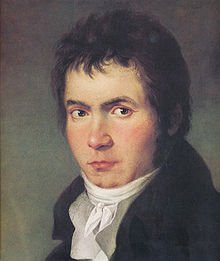Choral Fantasy (Beethoven)
| Choral Fantasy | |
|---|---|
| Composition for piano, chorus and orchestra by Ludwig van Beethoven | |

Beethoven, the composer, also pianist and conductor of the first performance in a benefit concert: detail of an 1804–05 portrait by J. W. Mähler
|
|
| Native name | Fantasia |
| Key | |
| Catalogue | Op. 80 |
| Language | German |
| Performed | 22 December 1808: Vienna |
| Movements | 2 |
| Scoring |
|
The Fantasy (Fantasia) for piano, vocal soloists, chorus, and orchestra, Op. 80, was composed in 1808 by Ludwig van Beethoven. It is known as the Choral Fantasy (Chorphantasie). Beethoven wrote the piece to conclude the Akademie, a benefit concert for him on 22 December 1808, performed by soloists, chorus and orchestra. The long program presented also the first performances of his Fifth and Sixth Symphonies and the Fourth Piano Concerto. Beethoven was the composer of all pieces, the pianist and the conductor.
The unusual composition unites piano, voices and orchestra. The work begins in C minor, but modulates during the second final movement to C major. The choral section at the end shows similarities in themes to the finale of his later Ninth Symphony.
The Fantasia was first performed at the Akademie (benefit concert) of 22 December 1808, which also saw the premieres of the Fifth and Sixth Symphonies and the Fourth Piano Concerto as well as a performance of excerpts of the Mass in C major. To conclude this memorable concert program, Beethoven wanted a "brilliant Finale" that would unite in a single piece the different musical elements highlighted in the concert night: piano solo, chorus and orchestra. The Fantasia, Op. 80, written shortly prior, was thus composed expressly to fulfil this role. Beethoven himself played the piano part and the opening solo offers an example of his improvisational style (at the premiere he did, in fact, improvise this section).
Beethoven wrote the piece during the second half of December, an unusually short time by his standards. He commissioned a poet—whose identity is disputed—to write the words shortly before the performance to fit the already written parts. According to Beethoven's pupil Carl Czerny, the poet was Christoph Kuffner; the later Beethoven scholar Gustav Nottebohm doubted this attribution and suggested it may have been Georg Friedrich Treitschke, who in 1814 prepared the final text of Beethoven's opera Fidelio.
...
Wikipedia
